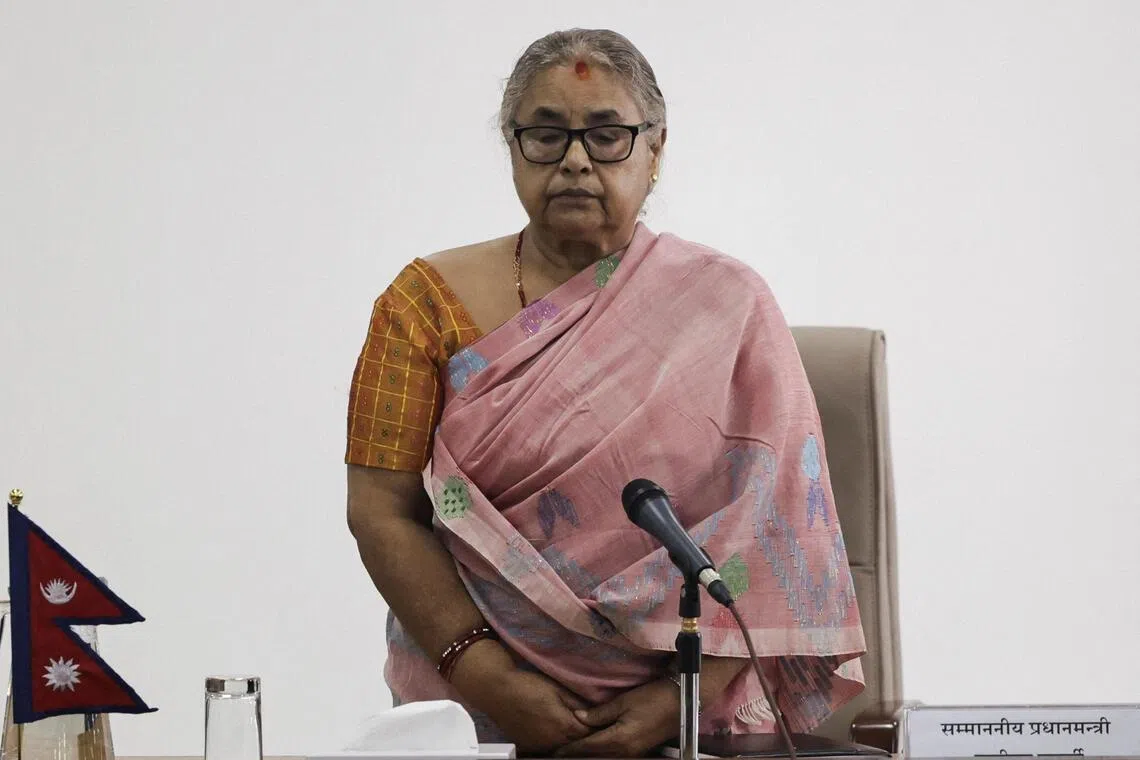Nepal’s new PM vows to follow protesters’ demands to end corruption
Sign up now: Get insights on Asia's fast-moving developments

Nepal’s new Prime Minister Sushila Karki has said she will step down in six months following elections set for March 5.
PHOTO: REUTERS
KATHMANDU – Nepal’s new leader vowed on Sept 14 to follow protesters’ demands to “end corruption” as she began work as interim prime minister after “Gen Z” youth demonstrations ousted her predecessor.
Ms Sushila Karki, the 73-year-old former chief justice, has been tasked with restoring order and addressing protesters’ demands for a corruption-free future ahead of elections in six months.
Protests, sparked by a ban on social media and feeding into longstanding economic woes, began on Sept 8 and quickly escalated, with Parliament and key government buildings set ablaze.
“We have to work according to the thinking of the Gen Z generation,” Ms Karki said in her first public comments since taking office on Sept 12.
A fifth of people in Nepal aged 15 to 24 are unemployed, according to the World Bank, with gross domestic product per capita standing at just US$1,447 (S$1,900), in the Himalayan nation of 30 million people.
“What this group is demanding is the end of corruption, good governance and economic equality,” added Ms Karki.
‘From the streets’
Ms Karki held a minute’s silence on Sept 14 for those killed in the unrest before meetings began in the key government complex of Singha Durbar, where several buildings were set on fire during mass protests on Sept 9.
At least 72 people were killed in two days of protests and 191 injured, the government’s Chief Secretary Eaknarayan Aryal said, increasing an earlier toll of 51.
It was the worst unrest
The appointment of Ms Karki
Thousands of young activists used the Discord app to name Ms Karki as their choice of next leader.
“The situation that I have come in, I have not wished to come here. My name was brought from the streets,” she said in a speech to the nation.
Parliament was dissolved and elections set for March 5, 2026.
“We will not stay here more than six months in any situation. We will complete our responsibilities and pledge to hand over to the next Parliament and ministers,” Ms Karki said.
Ordinary Nepalis said they were hopeful the government would bring change – but were aware the challenges were heavy.
“This government’s list of responsibilities and issues to address isn’t easy,” said grocery shopkeeper Satya Narayan, 69, in Pharping village, about an hour outside the capital.
“It also needs to ensure unity and harmony in the country by taking all sections along.”
Challenging times
Mr Paudel, who swore Ms Karki into office, said late on Sept 13 that “a peaceful solution has been found through a difficult process”.
Soldiers have scaled back their presence on the streets, where they had been deployed in large numbers after the protests.
But more than 12,500 prisoners who escaped from jails during the chaos are on the run, presenting a daunting security headache.
Regional leaders have congratulated Ms Karki, including Nepal’s two giant neighbours, India and China.
Prime Minister Narendra Modi said New Delhi supported “peace, progress and prosperity” in Hindu-majority Nepal, while Beijing’s Foreign Ministry said it wanted to “push China-Nepal relations steadily forward”.
Buddhism is the country’s second-largest religion, and the Dalai Lama, the exiled Tibetan spiritual leader, wished Ms Karki “every success in fulfilling the hopes and aspirations of the people of Nepal in these challenging times”. AFP


